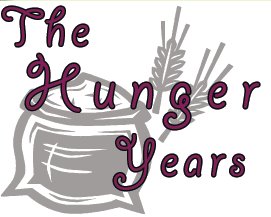 First, let me introduce myself. My name is Beth. I'm a friend of the creator of the Hunger Years blog. To my great excitement, Janelle requested that I contribute articles or ideas to this new blog. We're setting out on a serious endeavor here folks: to explore, research and document the world of food and how it affects all aspects of our lives. You'll most likely be hearing from me often. So let's get on with my first contribution.
First, let me introduce myself. My name is Beth. I'm a friend of the creator of the Hunger Years blog. To my great excitement, Janelle requested that I contribute articles or ideas to this new blog. We're setting out on a serious endeavor here folks: to explore, research and document the world of food and how it affects all aspects of our lives. You'll most likely be hearing from me often. So let's get on with my first contribution.Browsing food news, one can't help but notice the many headlines about genetically-modified food. Janelle has even commented on this in an earlier post. Some say this practice has great merit. This group often points to the practice of sending seeds or enriched flour to the hungry in third world countries. These seeds may be genetically modified to withstand drought or disease with the hopes of giving poor farmers more food. Enrich flour/corn is said to contain nutrients necessary for youngsters to develop normally. Detracters point to a plethora of environmental and medical risks, even ethical implications we can't even imagine at this point. For example, what if genetically-modified food affects our own genetics? What if these super-plants take over an area and kill off native flora/fauna that were necessary for that ecosystem (and the humans it supports) to survive?
Both sides of the debate have valid points, but what about a related field?*
 An article in our 'Food in the News' section entitled "Orange juice laced with anchovies: Superfood or Monster from the deep?" outlines a burgeoning area of food sales known as nutraceuticals or enriched foods.
An article in our 'Food in the News' section entitled "Orange juice laced with anchovies: Superfood or Monster from the deep?" outlines a burgeoning area of food sales known as nutraceuticals or enriched foods.What exactly is an 'enriched food'? Since the 1940s, the food manufacturers have added nutrients to their food to help boost the health of those who eat it. In the 1940s, it was the discovery that you could add B vitamins to food that created this revolution. I distinctly remember as a milk-hating kid in the 1990s drinking Vitamin-D- and calcium-enriched orange juice. Now we think nothing of finding labels on our food that say "Enriched/Enhanced with ______" (see left) or seeing commercials about yogurt with added bacteria to help regulate our digestive system.
But what is the difference between refining fish oil (chock full of all those beneficial Omega-3 fatty acids) to add to orange juice and genetically modifying oranges to produce fish oil/omega-3s as they grow?
It's a serious question to add to the modified-foods debate. And one still open for a discussion of our very own. Where do you draw the line? What do you think about the pros/cons of genetically-modified foods or enriched foods? Is this sort of food actually healthy or is it a bad practice of the overly-competitive food industry?
*disclaimer: I'm purposely keeping my own opinion out of the contents of this post and will most likely comment later once I've decided what I actually feel about the ideas presented here.




2 comments:
I think I just lost my appetite for OJ- I love drinking the nutrient-rich OJ, but I did not consider why they were so nutrient-rich.
Good post!
Yeah, like I said, I've found drinking the Vitamin-D/Calcium rich OJ necessary, but one wonders where some of these nutrients are coming from.
Me personally, I think that our current diets are so messed up that staying healthy is going to require a little messing with the recipe. But people need to be aware of what they are eating. You can overdose on Vitamin C, for example, and yet people are always trying to get 'extra' vitamin c to keep from getting a cold. And does Omega-3's distilled from fish affect people with fish allergies? I don't know that answer, but it is important.
Post a Comment